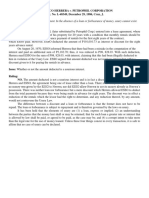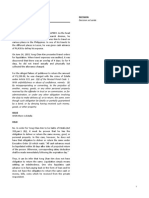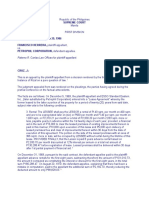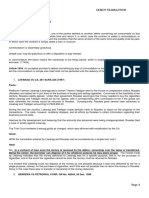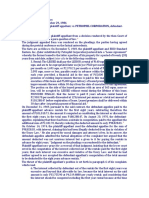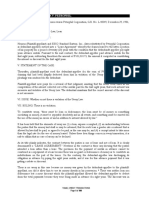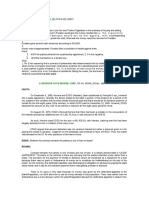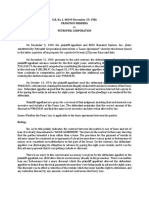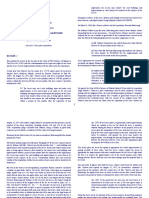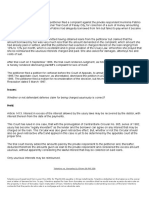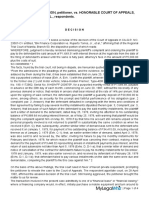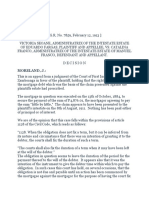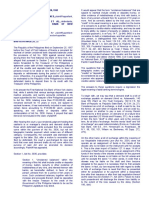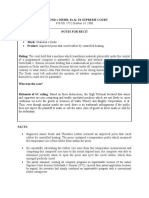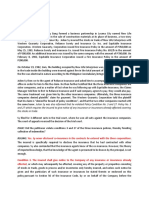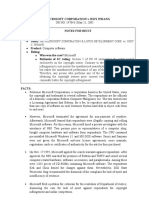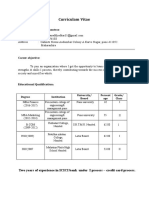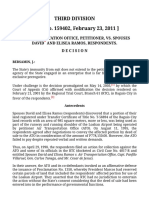Dela Cruz, Juan B.
General Concept of Loan
Credit Transactions / 2A Article 1933
Case Digest Herrera vs. Petrophil
Francisco Herrera vs. Petrophil Corporation
G.R. No. L-48349, 29 December 1986
FACTS:
On December 5, 1969, Francisco Herrera (Herrera) and ESSO Standard Eastern. Inc., (later
substituted by Petrophil Corporation) entered into a "Lease Agreement" whereby Herrera
leased to Petrophil a portion of his property for a period of twenty (20) years. One of the terms
of the agreement is for Herrera to be paid 8 years advance rental based on P2,930.70 per
month, discounted at 12% interest per annum, or a total net amount of P130,288.47, before
registration of lease. Leased premises shall be delivered within 30 days after 1st partial
payment of financial aid.
On December 31, 1969, Petrophil paid to Herrera advance rentals for the first eight years,
subtracting therefrom the amount of P101,010.73, the amount it computed as constituting the
interest or discount for the first eight years. On August 20, 1970, Petrophil, explaining that
there had been a mistake in computation, paid to Herrera the additional sum of P2,182.70,
thereby reducing the deducted amount to only P98,828.03.
On October 14, 1974, Herrera sued Petrophil for the sum of P98,828.03, with interest, claiming
this had been illegally deducted from him in violation of the Usury Law. In its answer, Petrophil
admitted the factual allegations of the complaint but argued that the amount deducted was not
usurious interest but given to it for paying the rentals in advance for eight years. Judgment on
the pleadings was rendered in favor of Petrophil.
Herrera now prays for a reversal of that judgment, insisting that the lower court erred in the
computation of the interest collected out of the rentals paid for the first eight years; that such
interest was excessive and violative of the Usury Law; and that he had neither agreed to nor
accepted Petrophil’s computation of the total amount to be deducted for the eight years
advance rentals.
ISSUES:
a. Whether or not the Usury Law applies in this case?
b. Whether or not the computation of the trial court as to the discount is correct?
RULING:
On Usury Law
a. The contract between the parties is one of lease and not of loan. The provision for the
payment of rentals in advance cannot be construed as a repayment of a loan because
there was no grant or forbearance of money as to constitute an indebtedness on the part
of the lessor. On the contrary, Petrophil was discharging its obligation in advance by paying
the eight years rentals, and it was for this advance payment that it was getting a rebate or
discount.
The provision for a discount is not unusual in lease contracts. As to its validity, it is settled
that the parties may establish such stipulations, clauses, terms and condition as they may
want to include; and as long as such agreements are not contrary to law, morals, good
customs, public policy or public order, they shall have the force of law between them.
1|Page
�Dela Cruz, Juan B. General Concept of Loan
Credit Transactions / 2A Article 1933
Case Digest Herrera vs. Petrophil
There is no usury in this case because no money was given by Petrophil to Herrera, nor
did it allow him to use its money already in his possession. There was neither loan nor
forbearance but a mere discount which Herrera allowed Petrophil to deduct from the total
payments because they were being made in advance for eight years. The discount was in
effect a reduction of the rentals which the lessor had the right to determine, and any
reduction thereof, by any amount, would not contravene the Usury Law.
The difference between a discount and a loan or forbearance is that the former does not
have to be repaid. The loan or forbearance is subject to repayment and is therefore
governed by the laws on usury.
To constitute usury, "there must be loan or forbearance; the loan must be of money or
something circulating as money; it must be repayable absolutely and in all events; and
something must be exacted for the use of the money in excess of and in addition to interest
allowed by law."
On the computation of the deductible discount
The trial court declared:
The computation made by plaintiff is patently erroneous. It is most seriously
misleading. He just computed the annual discount to be at P4,129.4880 and then
simply multiplied it by eight (8) years. He did not take into consideration the naked
fact that the rentals due on the eight year were paid in advance by seven (7) years,
the rentals due on the seventh year were paid in advance by six (6) years, those
due on the sixth year by five (5) years, those due on the fifth year by four (4) years,
those due on the fourth year by three (3) years, those due on the third year by two
(2) years, and those due on the second year by one (1) year, so much so that the
total number of years by which the annual rental of P4,129.4880 was paid in
advance is twenty-eight (28), resulting in a total amount of P118,145.44 (P4,129.48
multiplied by 28 years) as the discount. However, defendant was most fair to
plaintiff. It did not simply multiply the annual rental discount by 28 years. It
computed the total discount with the principal diminishing month to month as
shown by Annex 'A' of its memorandum. This is why the total discount amount to
only P 8,828.03.
We do not agree. The above computation appears to be too much technical mumbo-jumbo
and could not have been the intention of the parties to the transaction. Had it been so, then it
should have been clearly stipulated in the contract. Contracts should be interpreted according
to their literal meaning and should not be interpreted beyond their obvious intendment. Herrera
simply understood that for every year of advance payment there would be a deduction of 12%
and this amount would be the same for each of the eight years. There is no showing that the
intricate computation applied by the trial court was explained to him by Petrophil or that he
knowingly accepted it.
The lower court, following Petrophil's formula, declared that Herrera had actually agreed to a
12% reduction for advance rentals for all of twenty eight years. That is absurd. It is not normal
for a person to agree to a reduction corresponding to twenty eight years advance rentals when
all he is receiving in advance rentals is for only eight years. The above computation is based
on the more reasonable interpretation of the contract as a whole rather on the single stipulation
invoked by Petrophil for the flat reduction of P130,288.47.
2|Page
�Dela Cruz, Juan B. General Concept of Loan
Credit Transactions / 2A Article 1933
Case Digest Herrera vs. Petrophil
DISPOSITION:
Petrophil Corporation is ordered to pay Herrera the amount of Php65,114.35, with interest at
the legal rate until fully paid, plus PHP10,000.00 as attorney's fees.
3|Page






